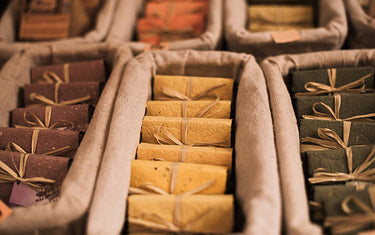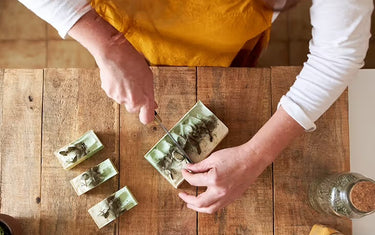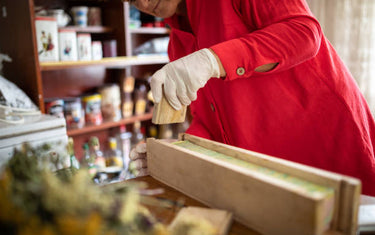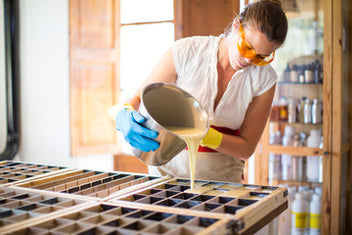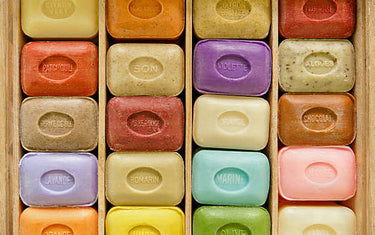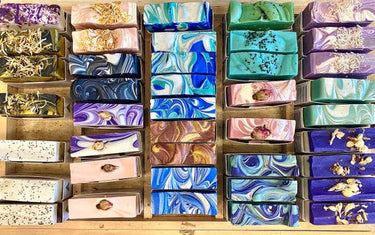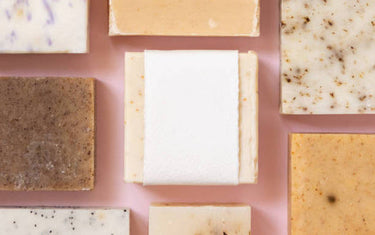7 min read / 1 October 2024 / yasmin sharp
7. How to Start a Soap Business
Learn how to start a successful soap business with our comprehensive guide on business planning, legal setup, marketing strategies, and scaling tips.
Share this post

If you want to know how to start a soap business, you may wonder where to start.
Launching a soap business can be rewarding, especially as demand grows for natural and handmade products.
Our guide will walk you through everything you need to start a soap business successfully.
From crafting a soap making business plan to scaling your operations and even developing a soap marketing strategy, we’ve got you covered.
Why Start a Soap Business?
The soap industry has seen a significant rise in demand for natural, handmade, and organic products.
Consumers are increasingly turning away from mass-produced, chemical-laden soaps and seeking out artisanal alternatives that are kinder to their skin and the environment.

What to Consider Before Starting A Soap Business
1. Make a Handmade Soap Business Plan
Before you start selling any soap products, you’ll need to plan appropriately and create your own soap business plan.
First, you need to define your niche. You have options such as organic, luxury, and artisanal soaps that offer opportunities to tap into specific audiences.
You'll also need to include thorough market research to understand your competitors and your customers' needs. Analysing competitors’ products, pricing, and marketing strategies will help you identify market trends and opportunities to differentiate your offerings.
You’ll also need clear goals. Start off with short-term targets, like launching your first product line or hitting early sales milestones. Regularly track progress using KPIs like sales, customer retention, and website traffic, adjusting your strategy as needed.
Realistic financial planning is also important. Make sure to estimate startup costs, conduct a break-even analysis, and set competitive pricing that covers materials, labour, and overheads while maintaining profitability.
Plus, if you’re setting up with a partner, you need to think about each of your roles beforehand. This will help your soap business run smoothly.
2. Think About Marketing Strategy
Creating a soap marketing strategy is another important part of your soap business plan. To make your own, start by building a user-friendly and mobile-optimised e-commerce website. You can use social media platforms like Instagram and Pinterest to showcase your products, engage with your audience, and push traffic to your site.
Offline marketing provides valuable face-to-face opportunities. Local markets and fairs let customers experience your soaps first-hand, while partnerships with boutiques or eco-friendly shops can expand your reach. A referral programme is also a great way to reward loyal customers and encourage them to spread the word.
Consistency in branding ties everything together. Whether your soaps are eco-friendly or luxurious, your logo, packaging, and messaging should reflect your brand identity across all platforms. This approach will help build trust and make your products memorable.
You'll also want to conduct a SWOT analysis. This will help you understand your strengths, weaknesses, opportunities, and threats so you can make informed decisions and plan strategies.

3. Consider Your Business Structure
The first step in setting up your soap business is choosing a business structure. This includes sole proprietorship, limited liability company (LLC), and corporation.
Each has its pros and cons, so take the time to identify which is the best option for you.
- Sole Proprietorship: The easiest to set up, but offers no personal liability protection.
- LLC: An LLC gives you personal liability protection and is relatively easy to set up, but may involve more paperwork and fees.
- Corporation: Offers the most protection but is more complex and costly to establish and maintain.
4. Legal and Financial Setup
To register your business, you’ll first need to use a business name that isn’t already in use. You can check the availability of your business name and register it through your local government’s website.
If you’re planning to sell homemade soap, you’ll need the right licences to keep everything above board. Depending on where you’re based, this could include cosmetic manufacturing permits or health and safety certificates. It’s worth double-checking the specific requirements in your area.
Insurance is one of those things you hope you’ll never need but can’t go without. Product liability insurance is a must in terms of protection if a customer has an issue with your soap, and general liability insurance covers accidents at your business location.
A business bank account is super helpful for keeping your finances in order. It makes tracking expenses, managing cash flow, and staying organised for tax time so much easier.
Taxes might not be the most exciting part of running a business, but they’re important to get right. You’ll likely need to handle income tax, sales tax, and possibly more. If you’re unsure where to start, an accountant or simple bookkeeping software can save you a lot of stress.
5. Market and Sell Your Soaps
The final part of the process is getting your product out there into the world, whether you’re selling white label soap or your own.
Branding and packaging play an important role in marketing. You should ensure that your branding is consistent across the board across all your packaging and marketing channels, both online and offline.
There are several different ways you can sell your soap. First, you have online sales channels, which include selling soap online using platforms such as Etsy, Amazon, and eBay.
Offline channels might include local shops, markets, and fairs. Each channel has pros and cons, so pick what works best for you. You could even try a combination of both channels for added reach, although your expenses will likely be higher.
Tools such as Google Analytics can help you measure the effectiveness of your online marketing. Likewise, analysing your sales data will provide insights into what’s working and what needs improvement.
You could also try out some retention strategies. This could include loyalty programs and sending out engaging newsletters and email marketing campaigns. Just don’t be too spammy — your customers won’t be happy!

6. Scaling Your Business
If you’re already making a healthy profit, then it will be up to you whether you want to scale your soap business.
However, scaling will be significant when starting out, as you’ll want to ensure you’re breaking even and turning a profit.
Below, we’ll break down four ways you could potentially expand your business. Let’s take a look.
Expanding Product Line
Expanding your product line can be a great way to scale up your business, providing that your product is something customers actually want. If your customers don’t want it, then it won’t sell.
For a soap business, you could expand your product line to include related items like lotions, scrubs, or bath bombs.
Bundling products together can also increase sales and provide some added value for your customers.
Growing Your Customer Base
To grow your customer base, try launching new products that appeal to different customer segments or increase your marketing efforts in new geographical areas.
While there is no guarantee it will work, it can help you to reach new audiences if it goes well.
Finding Suppliers
As your business scales, sourcing quality ingredients at a larger volume is key, and having strong relationships with your suppliers plays a part in this.
By fostering good relationships, it can help you receive consistent, high-quality materials at competitive prices, and thus maintain the quality of your products.
Advanced Marketing Strategies
If you can stretch your budget a little further, you may also want to consider partnering with influencers who can promote your products.
Paid advertising, such as Google Ads or social media ads, can also drive traffic to your website and increase sales.

7. Not All Your Time Will Be Spent Making Soap
When you run a soap business, you’ll quickly find that administrative tasks, like ordering supplies, tracking inventory, and staying on top of finances, take up a good chunk of your time. While it might not sound glamorous, staying organised will help you in the long run.
Customer service is another key part of the journey. Answering questions, handling complaints, and making sure your customers are happy might not be the creative part of the job, but it’s essential for building trust.
When customers know they can rely on you, they’re far more likely to come back.
Then there’s marketing, which will also take up a lot of time. From coming up with content and managing social media to running ads, promoting your soaps is going to take time and effort.
If your marketing strategy for the soap business includes collaborating with influencers or running paid ads, it’s worth setting aside a budget and dedicating time to track how these efforts perform. Platforms like Instagram or TikTok are especially great for visual products like soap, so don’t shy away from showing off your soaps.
Finally, as your business grows, logistics becomes a bigger focus. Scaling up production means sourcing quality materials in larger volumes, so having reliable suppliers is a must.
Good relationships with suppliers can make a big difference for your product quality and keeping your costs manageable. Managing demand, organising shipments, and ensuring customers receive their orders on time will also need your attention.
It can feel like a lot to handle, but these are the steps that help turn a small soap-making operation into a thriving business.
Running a soap business is a rewarding adventure, but it’s also a learning curve. Balancing creativity with the day-to-day operations can be challenging, but with a little planning and the right priorities, you’ll be well on your way to success.

In Summary
Knowing how to start a soap business involves careful planning and execution, but with the right strategies in place and soap making business plan, it can be profitable.
From sourcing quality materials like essential oils and fragrance oils to knowing how to promote soap products effectively, every step is important.
By following this guide, you’ll be well on your way to building a successful soap business that stands out in a competitive market.
Whether you’re interested in how to make money selling soap or simply looking for advice on how to market soap business effectively, we've got you covered.
If you have any questions or want to know how our products can help, feel free to get in touch with our team.
If you’re looking to start a soap business, sign up for a wholesale account with us to gain access to exclusive discounts.
It’s a great way to save money, especially for long term ventures such as selling your own soap.
[1] Bar Soap Market Size, Share & Trends Analysis Report By Type (Organic, Synthetic), By Application (Hair Care, Body/Skin Care, Facial Care, Specialized), By Distribution Channel, By Region, And Segment Forecasts, 2023 - 2030 https://www.grandviewresearch.com/industry-analysis/bar-soap-market-report


